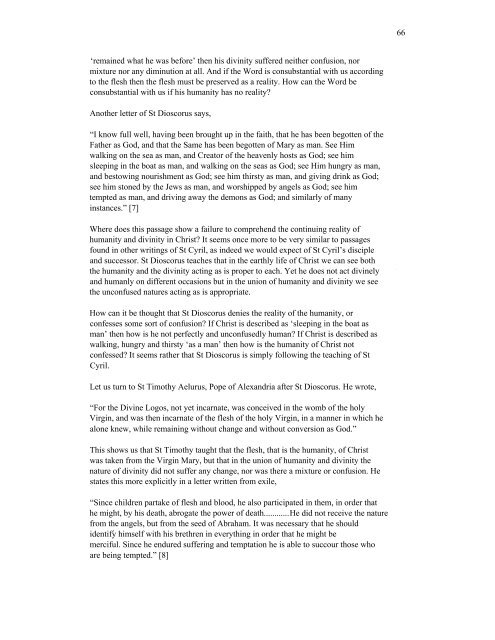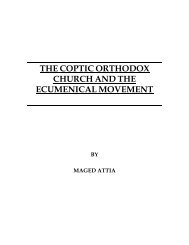Coptic interpretations of the Fourth Ecumenical Council - Saint Mina ...
Coptic interpretations of the Fourth Ecumenical Council - Saint Mina ...
Coptic interpretations of the Fourth Ecumenical Council - Saint Mina ...
You also want an ePaper? Increase the reach of your titles
YUMPU automatically turns print PDFs into web optimized ePapers that Google loves.
‘remained what he was before’ <strong>the</strong>n his divinity suffered nei<strong>the</strong>r confusion, nor<br />
mixture nor any diminution at all. And if <strong>the</strong> Word is consubstantial with us according<br />
to <strong>the</strong> flesh <strong>the</strong>n <strong>the</strong> flesh must be preserved as a reality. How can <strong>the</strong> Word be<br />
consubstantial with us if his humanity has no reality?<br />
Ano<strong>the</strong>r letter <strong>of</strong> St Dioscorus says,<br />
“I know full well, having been brought up in <strong>the</strong> faith, that he has been begotten <strong>of</strong> <strong>the</strong><br />
Fa<strong>the</strong>r as God, and that <strong>the</strong> Same has been begotten <strong>of</strong> Mary as man. See Him<br />
walking on <strong>the</strong> sea as man, and Creator <strong>of</strong> <strong>the</strong> heavenly hosts as God; see him<br />
sleeping in <strong>the</strong> boat as man, and walking on <strong>the</strong> seas as God; see Him hungry as man,<br />
and bestowing nourishment as God; see him thirsty as man, and giving drink as God;<br />
see him stoned by <strong>the</strong> Jews as man, and worshipped by angels as God; see him<br />
tempted as man, and driving away <strong>the</strong> demons as God; and similarly <strong>of</strong> many<br />
instances.” [7]<br />
Where does this passage show a failure to comprehend <strong>the</strong> continuing reality <strong>of</strong><br />
humanity and divinity in Christ? It seems once more to be very similar to passages<br />
found in o<strong>the</strong>r writings <strong>of</strong> St Cyril, as indeed we would expect <strong>of</strong> St Cyril’s disciple<br />
and successor. St Dioscorus teaches that in <strong>the</strong> earthly life <strong>of</strong> Christ we can see both<br />
<strong>the</strong> humanity and <strong>the</strong> divinity acting as is proper to each. Yet he does not act divinely<br />
and humanly on different occasions but in <strong>the</strong> union <strong>of</strong> humanity and divinity we see<br />
<strong>the</strong> unconfused natures acting as is appropriate.<br />
How can it be thought that St Dioscorus denies <strong>the</strong> reality <strong>of</strong> <strong>the</strong> humanity, or<br />
confesses some sort <strong>of</strong> confusion? If Christ is described as ‘sleeping in <strong>the</strong> boat as<br />
man’ <strong>the</strong>n how is he not perfectly and unconfusedly human? If Christ is described as<br />
walking, hungry and thirsty ‘as a man’ <strong>the</strong>n how is <strong>the</strong> humanity <strong>of</strong> Christ not<br />
confessed? It seems ra<strong>the</strong>r that St Dioscorus is simply following <strong>the</strong> teaching <strong>of</strong> St<br />
Cyril.<br />
Let us turn to St Timothy Aelurus, Pope <strong>of</strong> Alexandria after St Dioscorus. He wrote,<br />
“For <strong>the</strong> Divine Logos, not yet incarnate, was conceived in <strong>the</strong> womb <strong>of</strong> <strong>the</strong> holy<br />
Virgin, and was <strong>the</strong>n incarnate <strong>of</strong> <strong>the</strong> flesh <strong>of</strong> <strong>the</strong> holy Virgin, in a manner in which he<br />
alone knew, while remaining without change and without conversion as God.”<br />
This shows us that St Timothy taught that <strong>the</strong> flesh, that is <strong>the</strong> humanity, <strong>of</strong> Christ<br />
was taken from <strong>the</strong> Virgin Mary, but that in <strong>the</strong> union <strong>of</strong> humanity and divinity <strong>the</strong><br />
nature <strong>of</strong> divinity did not suffer any change, nor was <strong>the</strong>re a mixture or confusion. He<br />
states this more explicitly in a letter written from exile,<br />
“Since children partake <strong>of</strong> flesh and blood, he also participated in <strong>the</strong>m, in order that<br />
he might, by his death, abrogate <strong>the</strong> power <strong>of</strong> death............He did not receive <strong>the</strong> nature<br />
from <strong>the</strong> angels, but from <strong>the</strong> seed <strong>of</strong> Abraham. It was necessary that he should<br />
identify himself with his brethren in everything in order that he might be<br />
merciful. Since he endured suffering and temptation he is able to succour those who<br />
are being tempted.” [8]<br />
66








